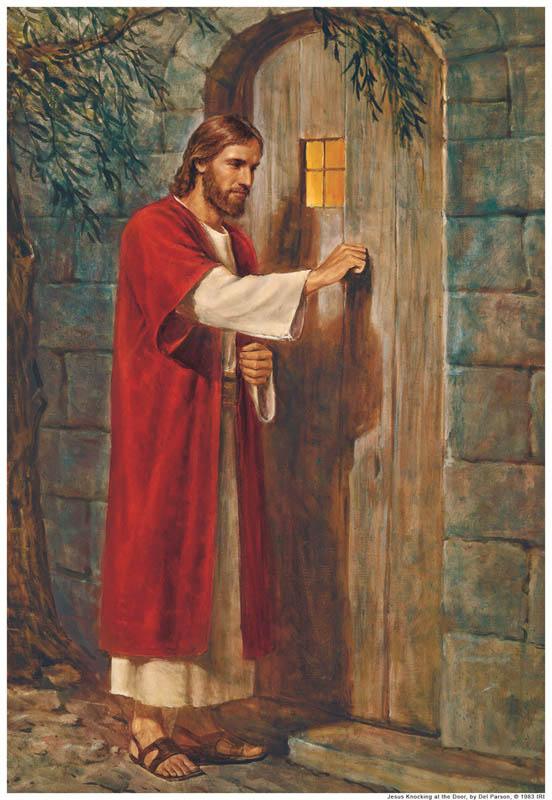A church near my house has a sign saying their sermon for this week is “From Volunteer to Disciple.” Since Mormon beliefs say that the Church should be a lay church, that topic caught my attention. Mormons need a lot of people to do all the work that needs doing, especially since we’re all volunteers with other jobs and responsibilities. That means pretty much everyone has at least one “calling,” which is how we refer to our volunteer jobs.
 Although we’re volunteers, in that we don’t get paid, we don’t actually volunteer for the jobs in most cases. Leaders pray about whom to invite to take the jobs. Of course, we’re free to refuse, but most of us don’t unless there is a really good reason because we know that God has a good reason for wanting us to do a calling, even if it might be outside our comfort zone. I’ve often found myself accepting callings I felt unqualified to carry out, only to discover I am capable of so much more than I ever gave myself credit for. Callings are one way to help us become everything God planned for us to be.
Although we’re volunteers, in that we don’t get paid, we don’t actually volunteer for the jobs in most cases. Leaders pray about whom to invite to take the jobs. Of course, we’re free to refuse, but most of us don’t unless there is a really good reason because we know that God has a good reason for wanting us to do a calling, even if it might be outside our comfort zone. I’ve often found myself accepting callings I felt unqualified to carry out, only to discover I am capable of so much more than I ever gave myself credit for. Callings are one way to help us become everything God planned for us to be.
As I thought about that church sign, I found myself thinking about the difference between a volunteer and a disciple and particularly about the process of moving from one to the other. When I start a new calling, I am often just a volunteer. I’m doing the job I was asked to do. Of course, I consider it important and I work hard at it but if it’s a calling I’ve never had before I often underestimate its importance. I love learning about a new calling, making plans, and getting everything organized and often I’m focused on these mechanics at first. At that point, I am only a volunteer—a dedicated one, but a volunteer.
Once everything is organized, I sometimes find myself less interested in the job, since for me the planning is the fun part. But now the real growth begins. With everything running smoothly, I find myself reading more about my calling, thinking about it, seeing beyond the basics. I start to understand how my work fits into the eternal scheme of things. I begin focusing on the eternal instead of the day-to-day aspects and then…I become a disciple. Now that I really understand the divine aspects of my work, I begin to do it for God, not just because I’m a compulsive volunteer. I work to achieve eternal goals and this is what makes someone a disciple.
Let’s look at some scriptures about discipleship to see what God considers a disciple’s role to be. At its most basic level, a disciple is a follower of Jesus Christ.
In John chapter 8, we read of Jesus saving the woman who was going to be stoned for committing adultery. Afterwards, he tried to the Pharisees why He did it, but they had trouble understanding what He meant. They didn’t’ really believe He was God’s son. They said they had only His word for it, but Jesus told them they had the testimony of two beings, which their own law took to be a sign of truth. They had His testimony and they also had God’s testimony. They continued to misunderstand His explanation of how He was the Son of God and did nothing of Himself. He did only what His Father told Him to do. This, really, was the sign of a disciple—one who does what pleases God, not what pleases Him. He was using his own life as an example of a disciple. While Jesus Christ is the only begotten Son of God, and divine, He was also a disciple of His Father.
30 As he spake these words, many believed on him.
31Then said Jesus to those Jews which believed on him, If ye continue in my word, then are ye my disciples indeed;
32And ye shall know the truth, and the truth shall make you free.
We learn, then, that a disciple will follow Jesus’ example and put the will of God before his own will and that in doing so, he will be spiritually free, regardless of his own circumstances in life.
In the Book of Mormon, we learn that God sent Jesus, after His death, to visit more of God’s children. We have a record of His time spent with a group of people in what is now the American continent. He told them:
Ye are my disciples; and ye are a light unto this people, who are a remnant of the house of Joseph (3 Nephi 15.)
From this verse, we learn that a disciple must be a light to the world. This means we are required to set an example to those around us. We take on the Savior’s name when we become Christians and we must use that name responsibly, living in a way that does honor to His teachings. While we won’t be perfect, it is our responsibility to be as obedient to the commandments as possible.
In the Doctrine and Covenants, a book of Mormon revelation in modern times, the Lord told His people: “And remember in all things the poor and the needy, the sick and the afflicted, for he that doeth not these things, the same is not my disciple (Doctrine and Covenants 52:40.)
A disciple, then, is one who serves people in need, in the same way Jesus consistently stopped to help even the seemingly least important people in his path—because He knew none of God’s children are unimportant.
These verses paint a clear picture of a disciple as one who follows the pattern set for us by the life Jesus Christ lived while He was on earth—one who puts God first, takes care of others, and sets a good example.
All of these things help us to understand how to go from a volunteer to a disciple. While it is important to carry out the actual duties of our assignment, it is also important to remember the purpose of the assignment and to ask ourselves how Jesus would do it. No volunteer assignment, especially in church, is too menial to have an eternal impact.
One of my two current assignments is in our toddler nursery. I am an aid to a two-year-old with cerebral palsy. She needs help to sit, stand, and walk and so I spend nearly two hours sitting and crawling on the floor, helping her to balance or to walk as she plays with the toys or participates in the lesson and songs. Together we play with toys or play small games. I help the other children learn to take care of her. I hold on to her while she plays. On the surface, this might seem to be a pretty small job. Other people are planning the day, preparing the lessons, and doing the big things in the nursery. However, my little task has eternal significance. Without my help, my little charge could not attend the nursery or would have to spend it in someone’s lap, rather than participating on an equal basis with the other children. Even though the nursery is for toddlers, it is not just a babysitting service. The children are learning important lessons about Jesus Christ in their music and lesson time. As they play they learn to get along with the other children and to interact with new adults. They are deciding how they feel about attending church classes and learning the skills they will soon need in the children’s program. My little task, helping one child succeed in having an experience like that of the other children, matters to that one little girl and her family.
I could look at my assignment as mere babysitting or I could look at it as serving one of God’s precious children. The first would be merely the work of a volunteer. The latter is the work of a disciple. As we play, I try to remain focused on the eternal significance of the task. I remember that I am on the Lord’s errand during the nursery class.
Think of the work you do in your own church, whether it’s an official assignment or just something you’ve taken on yourself because you love to serve. Do you greet newcomers so they feel welcome? Sit with a single mom to help with her children? Straighten the hymn books or empty the waste baskets? Teach a class? Take a meal to someone who is ill? No task is so small it is unimportant in God’s eternal plan. Do it with a focus on the eternal aspects of the work and you will be more than a volunteer—you will be a disciple.
About Terrie Lynn Bittner
The late Terrie Lynn Bittner—beloved wife, mother, grandmother, and friend—was the author of two homeschooling books and numerous articles, including several that appeared in Latter-day Saint magazines. She became a member of the Church at the age of 17 and began sharing her faith online in 1992.





I am prepairing a Relief Society Lesson on the Fourteen Fundamentals in Following the Prophet. I came upon your blog and see that you have commented on them. I can’t seem to get to the first comments. I can find the installments for Oct. through Dec. Can you help me? I would like to print off the whole lesson if I could.
Thank you so much!
I am a computer illiterate so any help you can give me would be appreciated
It looks like you probably have them all. The first article was in October and is here: http://beliefs.ldsblogs.com/9279/follow-the-prophet-an-introduction
Here are links to the others–I combined some of them.
part 2: http://beliefs.ldsblogs.com/9284/mormon-prophets-only-one-prophet-at-a-time
Part 3: http://beliefs.ldsblogs.com/9316/mormon-prophets-and-mormon-scriptures
Part 4: http://leaders.ldsblogs.com/9398/living-prophets
Part 5: http://leaders.ldsblogs.com/9406/the-mormon-prophet-will-not-lead-mormons-astray
Part 6: http://leaders.ldsblogs.com/9410/what-are-the-qualifications-to-be-a-mormon-prophet
Part 7: http://beliefs.ldsblogs.com/9429/mormon-prophets-teach-gods-values-not-mans
Part 8: http://leaders.ldsblogs.com/9448/what-can-a-mormon-prophet-receive-revelation-about
Part 9: http://beliefs.ldsblogs.com/9521/mormon-prophets
That covers all fourteen points. The later articles cover several related points combined into one article. Good luck with your class!